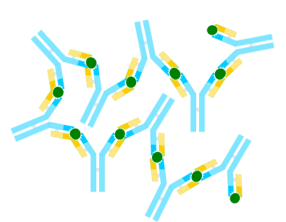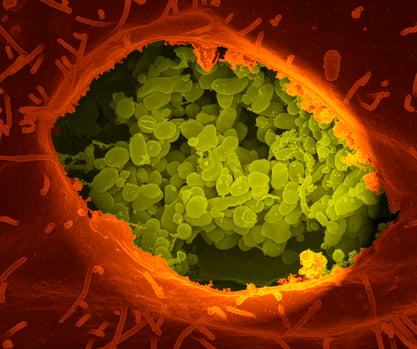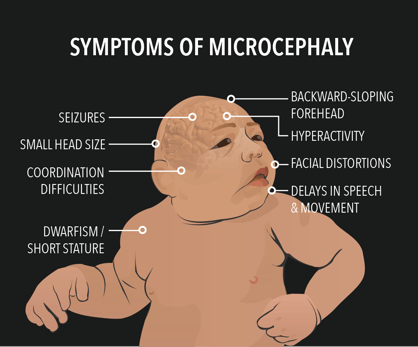
Small-cell lung cancer (SCLC) makes up about 10 - 15% of all lung cancer diagnoses, and is caused by smoking and inhaling second-hand smoke. This is an aggressive type of cancer that spreads quickly, and recurs extremely frequently after patients undergo chemotherapy treatments. Treatments for SCLC have not changed much in the past 30 years, but a team of researchers led by the Fred Hutchinson Cancer Research Center in Seattle has been investigating potential new therapy methods for the cancer and recently uncovered a gene that has the potential to be used in biology-based treatments for SCLC. (Image courtesy of Lindsay Fox via Wikimedia Commons and EcigaretteReviewed)
Read More
Tags:
Fred Hutchinson Cancer Research Center,
WA,
cancer research,
Seattle,
Hutch,
2016,
Fred Hutch,
BioResearch Product Faire,
Western,
small-cell lung cancer,
L-Myc,
SCLC
 Downy mildew, a fungus-like pathogen, is a major threat to crops around the country. Cucurbit crops like squash, cucumber, and melons suffered from a downy mildew outbreak in 2004 that initially only affected crops in the southeastern United States but later spread throughout the Midwestern region, and is still affecting these foods today. Michigan is a state where crops are greatly affected by downy mildew. A team of researchers from Michigan State University will be leading a $2.3 million project, granted by the U.S. Department of Agriculture, to develop methods to manage downy mildew. (Image courtesy of Kerstin Ellen Hantschel via Wikimedia Commons)
Downy mildew, a fungus-like pathogen, is a major threat to crops around the country. Cucurbit crops like squash, cucumber, and melons suffered from a downy mildew outbreak in 2004 that initially only affected crops in the southeastern United States but later spread throughout the Midwestern region, and is still affecting these foods today. Michigan is a state where crops are greatly affected by downy mildew. A team of researchers from Michigan State University will be leading a $2.3 million project, granted by the U.S. Department of Agriculture, to develop methods to manage downy mildew. (Image courtesy of Kerstin Ellen Hantschel via Wikimedia Commons)
Read More
Tags:
Michigan State University,
Midwest,
agriculture,
new research funding,
MI,
East Lansing,
MSU,
2016,
BioResearch Product Faire,
vegetable crops,
downy mildew
 Antibodies are essential for keeping the body healthy, as they are produced in the immune system and sent to fight harmful substances. Since they are essential for fighting off unwanted antigens in the body, antibodies are a hot topic that researchers are constantly studying. Recently, a research team from Duke University developed an antibody that specifically targets cancer cells, providing a possible new immunotherapy for cancer. (Image of antibody-antigen complex courtesy of Alejandro Porto via Wikimedia Commons)
Antibodies are essential for keeping the body healthy, as they are produced in the immune system and sent to fight harmful substances. Since they are essential for fighting off unwanted antigens in the body, antibodies are a hot topic that researchers are constantly studying. Recently, a research team from Duke University developed an antibody that specifically targets cancer cells, providing a possible new immunotherapy for cancer. (Image of antibody-antigen complex courtesy of Alejandro Porto via Wikimedia Commons)
Read More
Tags:
Duke University,
cancer research,
Durham,
NC,
Duke,
Antibodies,
BioResearch Product Faire,
cancer therapy,
eastern,
CFH
 Researchers around the world are constantly studying ways to create new treatment methods to fight cancer. With so many different forms of cancer, using one treatment method is not always effective for everyone battling this disease. Recently, a team of scientists in Chicago teamed up to create a new treatment method. Researchers from the University of Chicago and the biotechnology company Evelo Biosciences have partnered to develop a new microbiome-based immunotherapy treatment method for fighting cancer.
Researchers around the world are constantly studying ways to create new treatment methods to fight cancer. With so many different forms of cancer, using one treatment method is not always effective for everyone battling this disease. Recently, a team of scientists in Chicago teamed up to create a new treatment method. Researchers from the University of Chicago and the biotechnology company Evelo Biosciences have partnered to develop a new microbiome-based immunotherapy treatment method for fighting cancer.
Read More
Tags:
Midwest,
microbiome,
immunotherapy,
University of Chicago,
cancer research,
Chicago,
Front Line event,
IL,
UChicago,
2016,
BioResearch Product Faire,
cancer therapy,
Evelo Biosciences,
microbiome immunotherapy
 Neuroscience and genetics are two important topics life scientists are consistently studying. Researchers from UC Davis found a promising treatment for Huntington's Disease, while UC San Francisco was awarded $185 million to build a new neuroscience research institute. Recently on the East Coast, a team of researchers from the Columbia University Medical Center discovered a new neurodevelopmental syndrome as well as the genetic makeup of the mutations that cause the syndrome. (Image courtesy of Allen Ajifo via Wikimedia Commons)
Neuroscience and genetics are two important topics life scientists are consistently studying. Researchers from UC Davis found a promising treatment for Huntington's Disease, while UC San Francisco was awarded $185 million to build a new neuroscience research institute. Recently on the East Coast, a team of researchers from the Columbia University Medical Center discovered a new neurodevelopmental syndrome as well as the genetic makeup of the mutations that cause the syndrome. (Image courtesy of Allen Ajifo via Wikimedia Commons)
Read More
Tags:
Northeast,
Columbia University,
Neuroscience,
Columbia,
Genetics,
Neurology,
NY,
Columbia University Medical Center,
2016,
BioResearch Product Faire,
neurodevelopmental syndrome
Q fever, an infectious disease caused by the bacteria Coxiella burnetii, is common among livestock such as cattle, sheep and goats. The bacteria can be transmitted to humans through the inhalation of barnyard dust that is contaminated with animal excretion containing the bacteria. Along with passing from livestock to humans, Q fever has been aerosolized in the past and used for biological warfare.

(Image Courtest of Wikimedia Commons and the National Institutes of Health)
Read More
Tags:
CA,
vaccine research,
infectious diseases,
NIH funding,
UCI,
UC Irvine,
2016,
BioResearch Product Faire,
Western,
Coxiella burnetii,
Q Fever
 It is well known that infants rely on their mothers for food and nutrients in their early years. However, the effect that the hormones in this food have on an infant's development has not previously been known. Recent research conducted at the University of Colorado, Anschutz Medical Center has shown that hormones in human breast milk contribute to the health of the feeding infant. (Image by Voiceboks via Wikimedia Commons)
It is well known that infants rely on their mothers for food and nutrients in their early years. However, the effect that the hormones in this food have on an infant's development has not previously been known. Recent research conducted at the University of Colorado, Anschutz Medical Center has shown that hormones in human breast milk contribute to the health of the feeding infant. (Image by Voiceboks via Wikimedia Commons)
Read More
Tags:
University of Colorado,
Anschutz Medical Campus,
CO,
Fitz,
Aurora,
2016,
BioResearch Product Faire,
Western,
gut bacteria,
Gammaproteobacteria,
Breast milk

Microcephaly has been linked to the Zika virus
(Photo courtesy of of wikimedia commons)
With Zika outbreaks in Mexico, Central America, and South America, the National Institute of Child Health and Human Development (NICHD) is attempting to stop the virus at our border. To assist with this effort, the institute is funding a study led by Dr. William Britt, Professor of Pediatric Infectious Diseases at the University of Alabama at Birmingham (UAB). This study will take place in Brazil, where the World Health Organization (WHO) estimates that between 500,000 and 1.5 million people have been infected by Zika. The study will follow pregnant women in Brazil regardless of their Zika virus infection status and follow the infants suspected of having Zika from birth until 2 years of age.
Read More
Tags:
Bioresearch,
University of Alabama,
South,
University of Alabama Birmingham,
UAlab,
UAB,
Birmingham,
AL,
BioResearch Product Faire,
microcephaly,
zika,
Dr. Britt
The University of Illinois at Chicago is currently ranked in the top fifty for research institutions in the nation, with numerous deparments ranking in the top 10. Hundreds of researchers work throughout the university, investigating cutting-edge life science topics. In order to provide state-of-the-art research facilities to these leading life scientists, the College of Dentistry at UIC just renovated laboratory space on the first, fourth and fifth floors of the college.
Read More
Tags:
Midwest,
University of Illinois Chicago,
Chicago,
IL,
renovations,
research facilities,
UIC,
UIChgo,
2016,
BioResearch Product Faire,
Renovated research labs,
College of Dentistry

The University of California, Berkeley is a leading research institution, producing promising research in all divsions of the life sciences. To help further research in immunotherapy and cancer, researchers from the University of California, Berkeley have recently teamed up with the Berkeley-based biotech company, Aduro Biotech Inc., for a $7.5 million immunotherapy initiative. This Immunotherapeutics and Vaccine Research Initiative (IVRI) will provide three years of funding to infectious disease researchers studying new techniques for combating both infections and cancer.
Read More
Tags:
CA,
University of California Berkeley,
immunotherapy,
cancer research,
vaccine research,
Southwest,
researchers,
UC Berkeley,
new funding,
UCBerk,
2016,
BioResearch Product Faire,
Aduro Biotech





 Researchers around the world are constantly studying ways to create new treatment methods to fight cancer. With so many different forms of cancer, using one treatment method is not always effective for everyone battling this disease. Recently, a team of scientists in Chicago teamed up to create a new treatment method. Researchers from the
Researchers around the world are constantly studying ways to create new treatment methods to fight cancer. With so many different forms of cancer, using one treatment method is not always effective for everyone battling this disease. Recently, a team of scientists in Chicago teamed up to create a new treatment method. Researchers from the 

 It is well known that infants rely on their mothers for food and nutrients in their early years. However, the effect that the hormones in this food have on an infant's development has not previously been known. Recent
It is well known that infants rely on their mothers for food and nutrients in their early years. However, the effect that the hormones in this food have on an infant's development has not previously been known. Recent 
